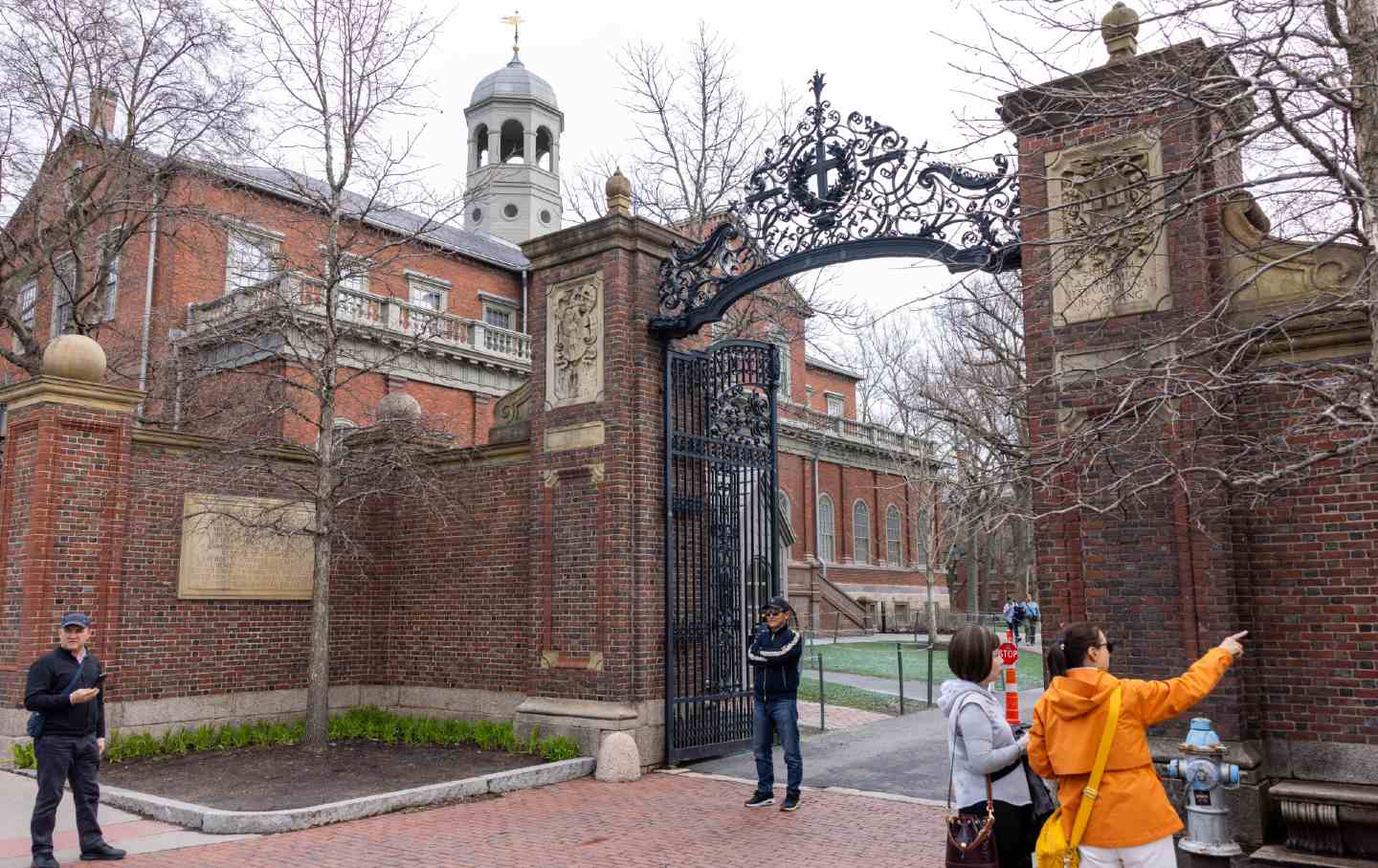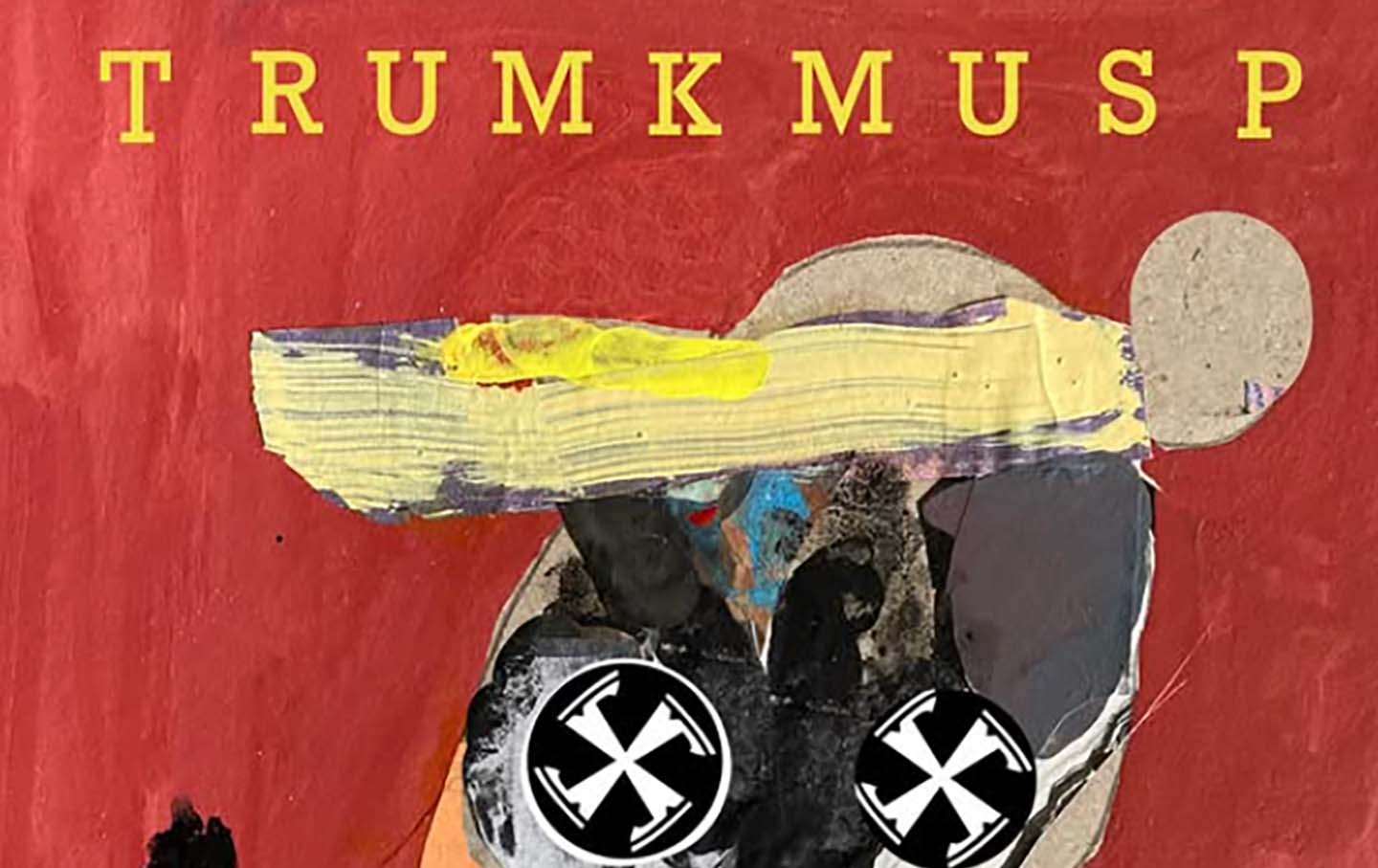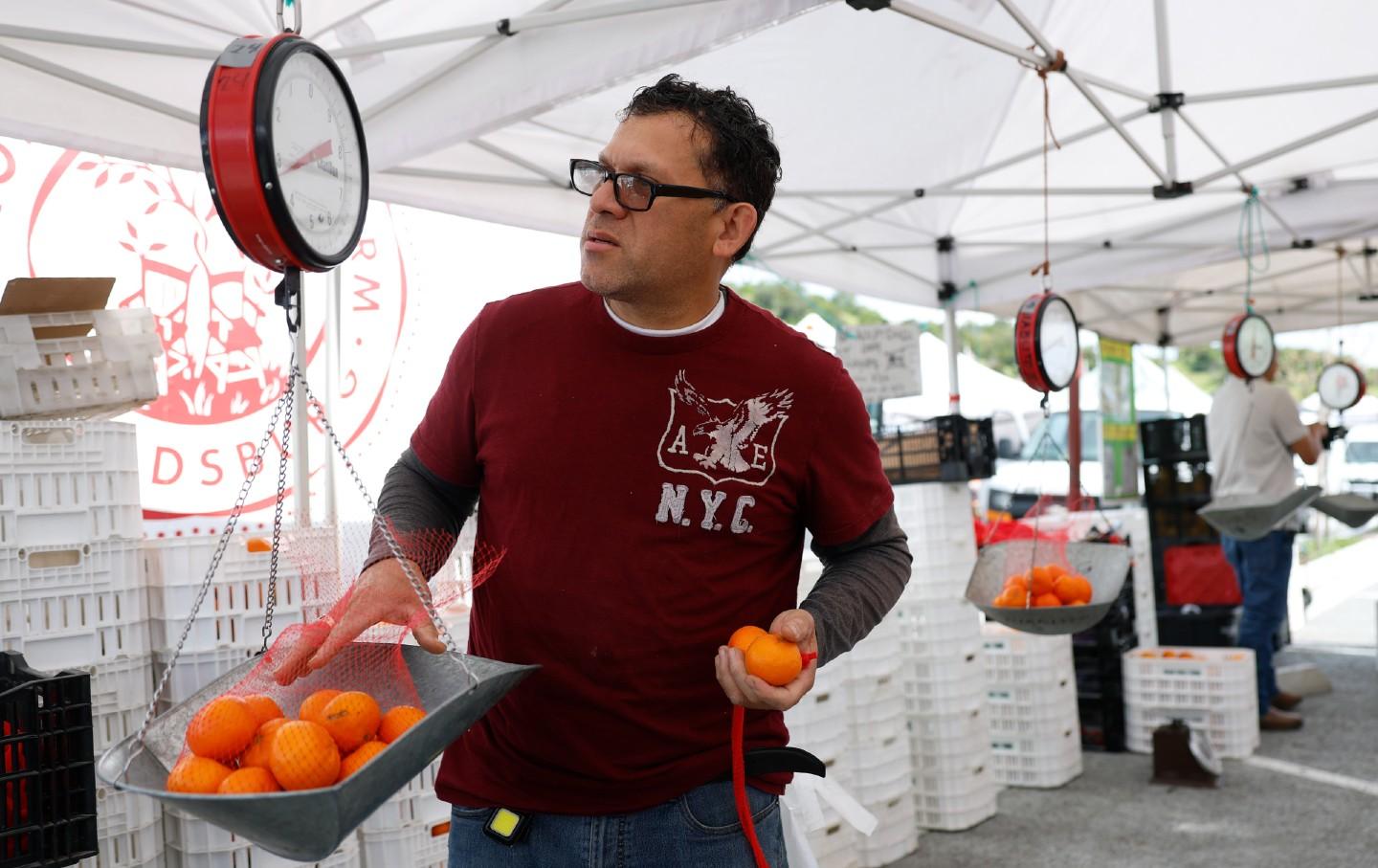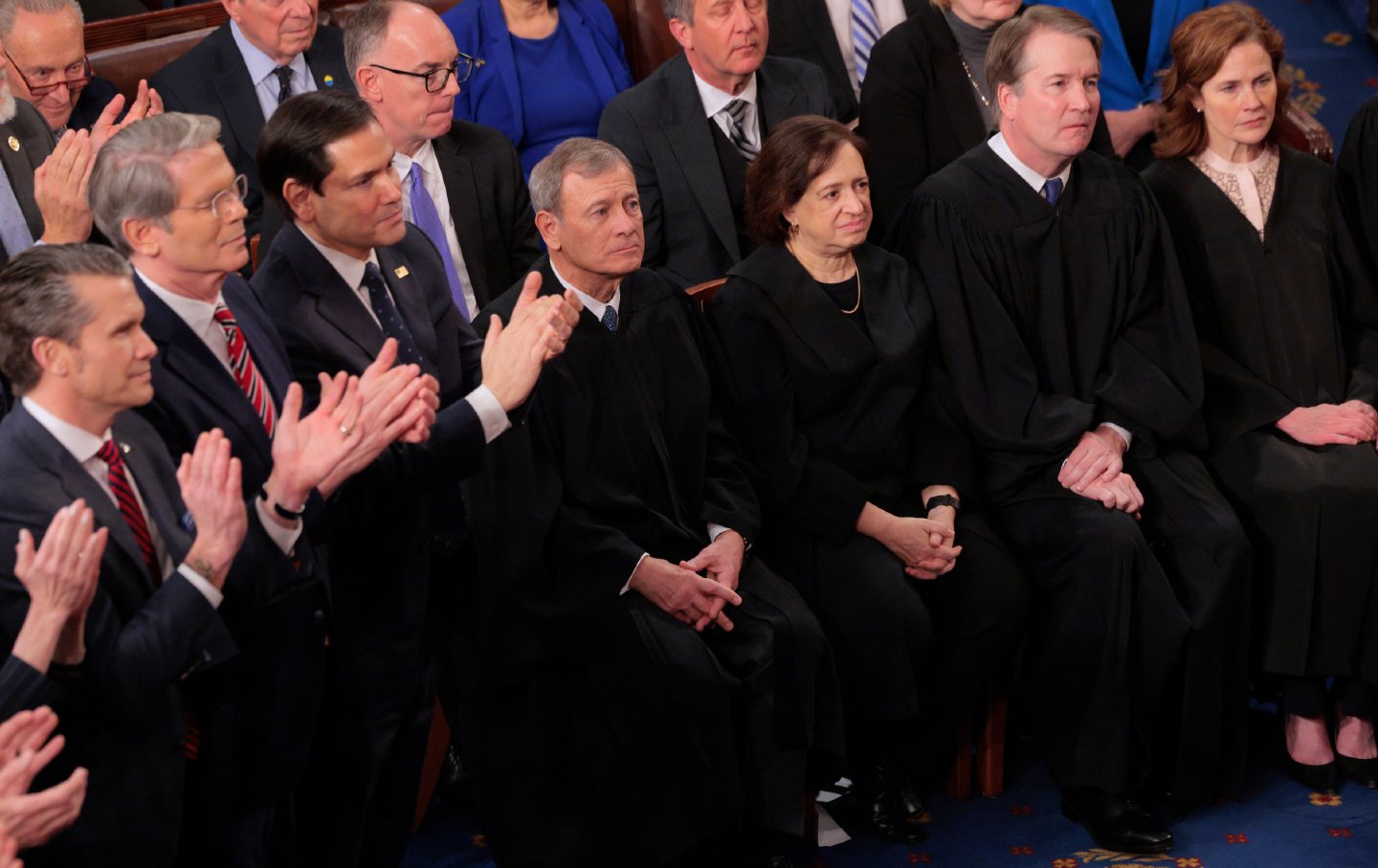Mark Kelly Wasn’t There for Labor When Labor Needed Him
The senator from Arizona refused to cosponsor labor’s top legislative priority when it mattered. Only when he made the vice-presidential short list did he step up from Arizona.
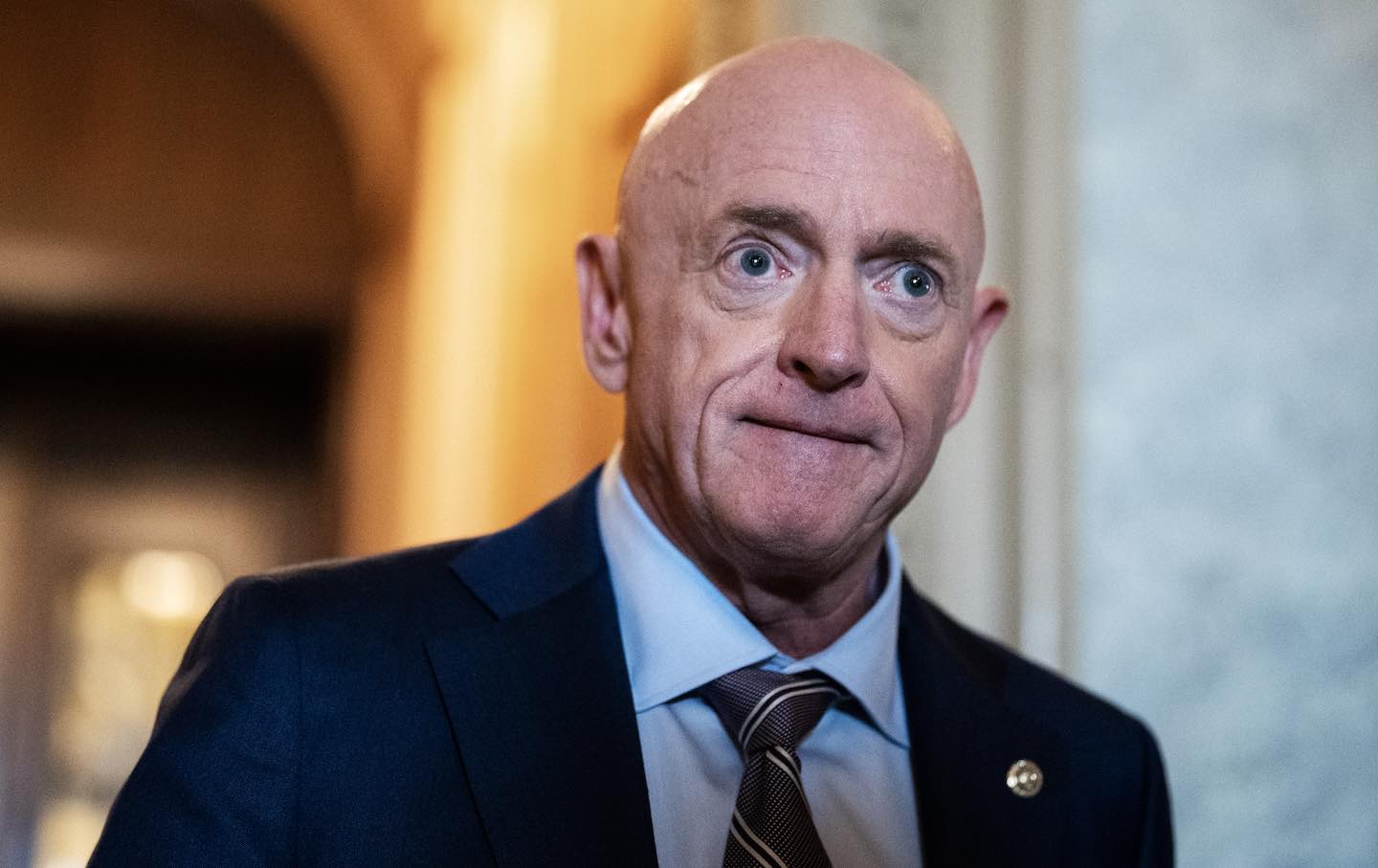
Senator Mark Kelly (D-AZ) is seen during senate votes in the US Capitol on July 31.
(Tom Williams / CQ Roll Call)
Organized labor is not just a key constituency for the Democratic Party. It is the most powerful force this country has for countering the overwhelming influence—and abusive overreach—of multinational corporations and the billionaire class. Kamala Harris knows this. That’s why she has focused so much of her vice presidency on advancing the cause of labor—traveling the country to meet publicly and privately with union leaders, organizers, and activists in her capacity as chair of the White House Task Force on Worker Organizing and Empowerment. In the administration’s first year, the project yielded more that 70 recommendations—many of which have been implemented—for making it easier for workers to organize and engage in collective bargaining. In the summer of 2022, she told me in an interview, “This is the beginning of the next era of the labor movement.”
Given Harris’s longtime support of workers’ rights, unions were quick to endorse her bid for the presidency. That enthusiasm was on display Wednesday night, when thousands of union members participated in a nationwide Labor for Harris Organizing Call. “We have walked the walk with her,” declared Randi Weingarten, the president of the 1.7-million-member American Federation of Teachers, who said that Harris’s candidacy “has riveted my members in the last week or two.”
The next big test for Harris will be her selection of a vice-presidential running-mate. Most of the potential picks are labor stalwarts. But one possible VP pick, Arizona Senator Mark Kelly, has a record that has raised concerns among union leaders and members. Of particular concern has been Kelly’s reluctance—until very recently—to embrace labor’s top legislative priority, the Protecting the Right to Organize (PRO) Act.
After the Democrats took charge of the White House and both chambers of Congress in January 2021, lawmakers introduced the PRO Act in an effort to expand union power. The measure is a sweeping plan to remove barriers to organizing workplaces across the country, and to make it possible for labor and national unions to bargain equitable contracts. The AFL-CIO describes the PRO Act, which is ardently backed by union activists and by Biden and Harris, as “the most significant worker empowerment legislation since the Great Depression.” Predictably, it is opposed by corporate interests and their congressional allies.
In March 2021, the PRO Act passed the House with bipartisan support, in a 225-206 vote that then–AFL-CIO president Richard Trumka described as “a game-changer” for working Americans. “If you really want to correct inequality in this country—wages and wealth inequality, opportunity and inequality of power—passing the PRO Act is absolutely essential to doing that,” said Trumka in 2021, when he urged the Senate, where Democrats had a narrow advantage, to advance the legislation to President Biden’s desk.
The Senate failed to do so because, in addition to overwhelming Republican opposition, a handful of Senate Democratic Caucus members were reluctant to sign on for the measure, including West Virginia’s Joe Manchin, Maine’s Angus King, Virginia’s Mark Warner, and the two senators from Arizona, Kyrsten Sinema and Kelly. In the face a major campaign led by the International Union of Painters and Allied Trades and other unions, Manchin and King joined the vast majority of Senate Democrats as cosponsors in April 2021, bringing the number of cosponsors to 47. Senate majority leader Chuck Schumer said the chamber would bring the measure to a vote if 50 Democrats agreed to cosponsor it. Strategizing began for efforts to break an anticipated Republican filibuster in order to pass the bill.
Kelly was seen as the key senator to make it all happen. If he moved, the argument went, Sinema could be convinced to do the same. And if they both signed on, a massive AFL-CIO push was planned in order to get Warner on board. But Kelly never moved, assuring that the measure would, in the words of the Revolving Door Project “stagnate in the Senate.”
After Trumka’s death in the summer of 2021, the legislation was renamed in the longtime AFL-CIO leader’s honor. But still it was stalled, through the 117th Congress and into the 118th. Henry Burke, a senior researcher at the Revolving Door Project, noted last month, just two days after Biden decided to stand down as the Democratic candidate for president and hand the mantle to Harris, “While Kelly has hinted that he may be open to considering some provisions of the PRO Act, two years later, he remains one of only two Senate Democrats not cosponsoring the legislation.”
That was a consequential observation, since Kelly’s name had by then surfaced as a leading prospect to join Harris as her vice-presidential running mate on the ticket of a party that will need enthusiastic support from unions and their members this fall. Harris is garnering that support, winning strong endorsements from the AFL-CIO and major unions such as the Service Employees International Union; the United Food & Commercial Workers International Union; the American Federation of State, County and Municipal Employees; the International Brotherhood of Electrical Workers; the Laborers International Union of North America; the United Steelworkers; and the United Auto Workers. These unions know Harris; they know her record, and they are enthusiastic about her candidacy—as was obvious from the rapturous response the vice president received when she appeared last week at the Houston convention of the American Federation of Teachers, which was one of the first unions to endorse her.
But there have been questions about Kelly. Last week, when TV networks began reporting on the senator’s failure to cosponsor the PRO Act, Transport Workers Union President John Samuelsen, a key player on the national labor scene, asked ABC News, “Why would the Democrats even consider a senator for the vice presidency if he doesn’t support the PRO Act?” An unnamed union president told ABC, “The Democrats cannot have someone on the ticket who is identified as soft on labor. This is a huge problem.”
Kelly got the message. Last Wednesday, the senator signaled that he would support the PRO Act if it came up for a vote on the Senate floor. Even then, however, he sounded unenthusiastic. “I am, like a lot of legislation, working to make it better,” the senator said of the legislation that the vast majority of his Democratic colleagues found to be sufficiently well-crafted to cosponsor. “But if it came to the floor today or any day going back to the day I was sworn in, I would vote for it.” His office also released a statement arguing that the senator “has been a strong supporter of workers throughout his time in the Senate.”
Yet, as the Revolving Door Project’s Burke has noted:
Kelly’s opposition to the PRO Act is not the only instance of his intransigence on labor issues. In 2022, Kelly joined Sinema and Manchin to hand the Biden administration a surprise defeat in the Senate on a nominee to lead the Labor Department’s Wage and Hour Division. The move was the first time that a Biden nominee had lost a Senate floor vote, surprising both the administration and Senate leadership. The nominee, David Weil, had previously served as the head of Wage and Hour under the Obama administration, so was widely considered to be highly qualified to retake the post. But Kelly, Sinema and Manchin voted against him, with Kelly openly stating that his opposition was motivated by the decisions Weil had made under the Obama administration. These decisions included extending overtime to more American workers, increasing the number of employers considered to be joint employers (and thus undermining a loophole enabling powerful corporations to avoid legal accountability for their labor practices), and limiting the ability of firms to label employees as “independent contractors.” These decisions were extremely unpopular with business groups, with those in the gig economy and restaurant industries among those most affected by joint employer rules and the limiting of independent contracting.
Kelly is not an anti-labor zealot, like many of his Republican colleagues. He speaks favorably about the experience of family members who were in unions. And he gets OK marks from Arizonans who are involved with the labor movement, like Israel Torres, a spokesperson for the Arizona Building and Construction Trades Council. Torres told The Arizona Republic last week, “He’s a pragmatist and we haven’t seen eye-to-eye on every issue. But he’s surely been someone to roll his sleeves up and fight for what he thinks is important, and we’ve found that more often than not to be very consistent with labor needs.”
But the fact is that Kelly’s been a good deal slower to line up for labor rights than prospective vice presidential nominees, such as Minnesota Governor Tim Walz, Kentucky Governor Andy Beshear, and Michigan Governor Gretchen Whitmer—and Kamala Harris, herself.
Popular
“swipe left below to view more authors”Swipe →Hold the powerful to account by supporting The Nation
The chaos and cruelty of the Trump administration reaches new lows each week.
Trump’s catastrophic “Liberation Day” has wreaked havoc on the world economy and set up yet another constitutional crisis at home. Plainclothes officers continue to abduct university students off the streets. So-called “enemy aliens” are flown abroad to a mega prison against the orders of the courts. And Signalgate promises to be the first of many incompetence scandals that expose the brutal violence at the core of the American empire.
At a time when elite universities, powerful law firms, and influential media outlets are capitulating to Trump’s intimidation, The Nation is more determined than ever before to hold the powerful to account.
In just the last month, we’ve published reporting on how Trump outsources his mass deportation agenda to other countries, exposed the administration’s appeal to obscure laws to carry out its repressive agenda, and amplified the voices of brave student activists targeted by universities.
We also continue to tell the stories of those who fight back against Trump and Musk, whether on the streets in growing protest movements, in town halls across the country, or in critical state elections—like Wisconsin’s recent state Supreme Court race—that provide a model for resisting Trumpism and prove that Musk can’t buy our democracy.
This is the journalism that matters in 2025. But we can’t do this without you. As a reader-supported publication, we rely on the support of generous donors. Please, help make our essential independent journalism possible with a donation today.
In solidarity,
The Editors
The Nation

